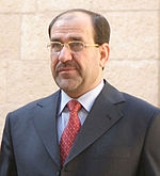
Prime Minister of Iraq
Encyclopedia
The Prime Minister of Iraq
is Iraq's head of government
. Prime Minister was originally an appointed office, subsidiary to the head of state
, and the nominal leader of the Iraqi parliament. Under the newly adopted constitution the Prime Minister is to be the country's active executive
authority. Nouri al-Maliki
(formerly Jawad al-Maliki) was selected to be Prime Minister on 21 April 2006.
, the Members of the Iraqi National Assembly choose the Presidency Council, including the Prime Minister
and the Council of Ministers.
The Presidency Council then shall name a Prime Minister unanimously. According to this, the Presidency Council must agree on a candidate for the post within two weeks. In the event that it fails to do so, the responsibility of naming the Prime Minister reverts to the National Assembly. In that event, the National Assembly must confirm the nomination by a two-thirds majority. If the Prime Minister is unable to nominate his Council of Ministers within one month, the Presidency Council shall name another Prime Minister..
. As of 30 June 2009, there had been legislation in progress for a year to make the Iraqi CTB a separate ministry.
Iraq
Iraq ; officially the Republic of Iraq is a country in Western Asia spanning most of the northwestern end of the Zagros mountain range, the eastern part of the Syrian Desert and the northern part of the Arabian Desert....
is Iraq's head of government
Head of government
Head of government is the chief officer of the executive branch of a government, often presiding over a cabinet. In a parliamentary system, the head of government is often styled prime minister, chief minister, premier, etc...
. Prime Minister was originally an appointed office, subsidiary to the head of state
Head of State
A head of state is the individual that serves as the chief public representative of a monarchy, republic, federation, commonwealth or other kind of state. His or her role generally includes legitimizing the state and exercising the political powers, functions, and duties granted to the head of...
, and the nominal leader of the Iraqi parliament. Under the newly adopted constitution the Prime Minister is to be the country's active executive
Executive (government)
Executive branch of Government is the part of government that has sole authority and responsibility for the daily administration of the state bureaucracy. The division of power into separate branches of government is central to the idea of the separation of powers.In many countries, the term...
authority. Nouri al-Maliki
Nouri al-Maliki
Nouri Kamil Mohammed Hasan al-Maliki , also known as Jawad al-Maliki or Abu Esraa, is the Prime Minister of Iraq and the secretary-general of the Islamic Dawa Party. Al-Maliki and his government succeeded the Iraqi Transitional Government. He is currently in his second term as Prime Minister...
(formerly Jawad al-Maliki) was selected to be Prime Minister on 21 April 2006.
Appointment
Under the Iraqi Transitional GovernmentIraqi Transitional Government
The Iraqi Transitional Government was the government of Iraq from May 3rd, 2005, when it replaced the Iraqi Interim Government, until May 20th, 2006, when it was replaced by the first permanent government....
, the Members of the Iraqi National Assembly choose the Presidency Council, including the Prime Minister
Prime minister
A prime minister is the most senior minister of cabinet in the executive branch of government in a parliamentary system. In many systems, the prime minister selects and may dismiss other members of the cabinet, and allocates posts to members within the government. In most systems, the prime...
and the Council of Ministers.
The Presidency Council then shall name a Prime Minister unanimously. According to this, the Presidency Council must agree on a candidate for the post within two weeks. In the event that it fails to do so, the responsibility of naming the Prime Minister reverts to the National Assembly. In that event, the National Assembly must confirm the nomination by a two-thirds majority. If the Prime Minister is unable to nominate his Council of Ministers within one month, the Presidency Council shall name another Prime Minister..
Agencies directly subordinate
The Iraqi Counter Terrorism Bureau reports to the Prime Minister directly. The Iraqi CTB oversees the Iraqi Counter Terrorism Command, a formation that includes all Iraqi Special Operations ForcesIraqi Special Operations Forces
Iraqi Special Operations Forces refers to the Iraqi special forces unit created by Coalition forces after the 2003 invasion. As of November 2009, the forces, directed by the Iraqi Counter-Terrorist Bureau, consist of the Iraqi Counter-Terrorist Command, which has two brigades subordinate to it...
. As of 30 June 2009, there had been legislation in progress for a year to make the Iraqi CTB a separate ministry.

